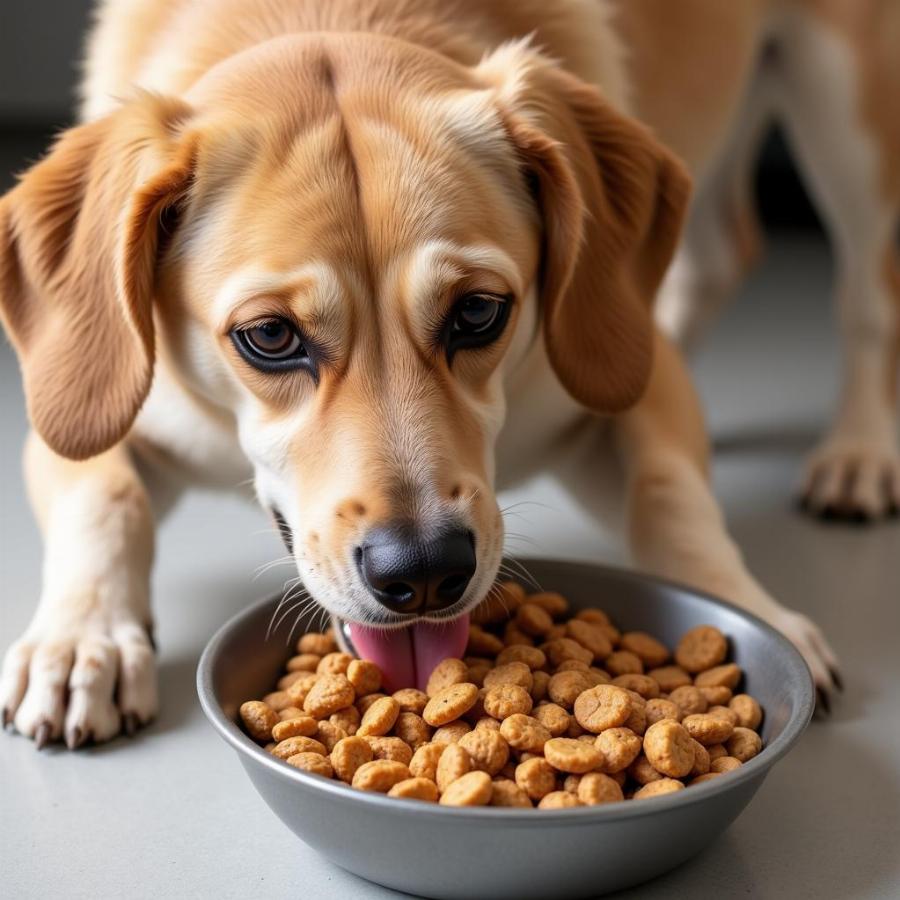Helping your furry friend reach a healthy weight is a top priority for any loving dog owner. If you’re wondering how to help your dog gain weight safely and effectively, you’ve come to the right place. This comprehensive guide will explore the various reasons why a dog might be underweight and provide practical strategies for encouraging healthy weight gain.
Understanding Why Your Dog is Underweight
Before jumping into solutions, it’s crucial to understand the underlying cause of your dog’s low weight. While some dogs are naturally leaner than others, unexplained weight loss can be a sign of an underlying health issue. Possible causes include:
- Parasites: Intestinal parasites can steal vital nutrients from your dog’s food, leading to weight loss.
- Dental Issues: Painful teeth or gums can make eating difficult, causing a decrease in food intake.
- Stress or Anxiety: Changes in routine, new environments, or separation anxiety can significantly impact a dog’s appetite.
- Underlying Medical Conditions: Diseases such as diabetes, kidney disease, cancer, and inflammatory bowel disease can all contribute to weight loss.
If you suspect a medical issue, it’s essential to consult with your veterinarian for a proper diagnosis and treatment plan.
Strategies for Healthy Weight Gain in Dogs
Once you’ve ruled out any underlying health problems, you can focus on implementing strategies to help your dog gain weight. Here are some effective methods:
Adjusting Your Dog’s Diet
- Increase Caloric Intake: Opt for a high-quality dog food specifically formulated for weight gain. These foods are typically higher in fat and protein. You can also supplement their regular meals with healthy, calorie-dense additions like cooked chicken, sweet potatoes, or can dogs have goats milk?
- Smaller, More Frequent Meals: Feeding your dog smaller meals more frequently can be easier on their digestive system and encourage increased food intake.
- High-Quality Protein: Ensure your dog’s diet includes sufficient high-quality protein sources to support muscle growth.
Supplements and Nutritional Aids
- Consult Your Vet: Before adding any supplements to your dog’s diet, consult with your veterinarian. They can recommend appropriate supplements based on your dog’s specific needs.
- Consider benefits of bone broth for dogs: Bone broth can be a nutritious and palatable addition to your dog’s diet, providing extra calories and supporting joint health.
 Dog Eating High Calorie Meal
Dog Eating High Calorie Meal
Encouraging Exercise and Play
While it might seem counterintuitive, appropriate exercise can stimulate your dog’s appetite and help them build healthy muscle mass. Avoid overexertion, especially if your dog is significantly underweight.
Managing Stress and Anxiety
- Create a Calm Environment: A stress-free environment can significantly impact your dog’s appetite. Provide a comfortable, safe space for your dog to relax and feel secure.
- Routine and Consistency: A predictable routine can help reduce anxiety and encourage regular eating habits.
How Can I Tell if My Dog is Gaining Weight Healthily?
Monitoring your dog’s progress is key. Regular weigh-ins, along with observing their body condition score, can help you assess whether they are gaining weight appropriately. You should be able to feel their ribs easily, but they shouldn’t be prominent.
FAQ: Frequently Asked Questions About Dog Weight Gain
- Q: How quickly should my dog gain weight? A: Gradual weight gain is ideal. Rapid weight gain can put undue stress on your dog’s organs.
- Q: What are some healthy treats for weight gain? A: Cooked sweet potato, plain yogurt, and lean meats are good options.
- Q: Can I give my dog human food to help them gain weight? A: While some human foods are safe for dogs, it’s best to consult with your veterinarian before making any significant dietary changes.
- Q: What if my dog is a picky eater? A: Try different flavors and textures of food to find something your dog enjoys.
- Q: Should I be worried if my senior dog is losing weight? A: Yes, unexplained weight loss in senior dogs should always be investigated by a veterinarian.
- Q: Can certain medications cause weight loss in dogs? A: Yes, some medications can affect appetite or metabolism.
- Q: How do I calculate my dog’s ideal weight? A: Your veterinarian can help you determine your dog’s ideal weight based on their breed, age, and overall health.
Additional Questions and Resources
- What are the best dog foods for weight gain?
- How can I help my puppy gain weight?
- What are the signs of malnutrition in dogs?
For more information on dog health and wellness, check out our articles on dog that starts with x and treat pouch dog training.
Conclusion
Helping your dog gain weight requires patience, consistency, and a thorough understanding of their individual needs. By addressing the underlying cause of their low weight and implementing a tailored plan, you can help your furry friend achieve a healthy weight and enjoy a happy, active life. Remember to consult with your veterinarian throughout the process to ensure your dog’s safety and well-being.
Beaut Dogs is your one-stop resource for all things dog-related. We offer expert advice, helpful tips, and in-depth information about the world of canines, from breed characteristics and care guides to training and nutrition. When you need assistance, don’t hesitate to contact us at Email: [email protected] for detailed and accurate answers from Beaut Dogs. Visit https://beautdogs.com to explore the wonderful world of dogs and learn how to care for them best!